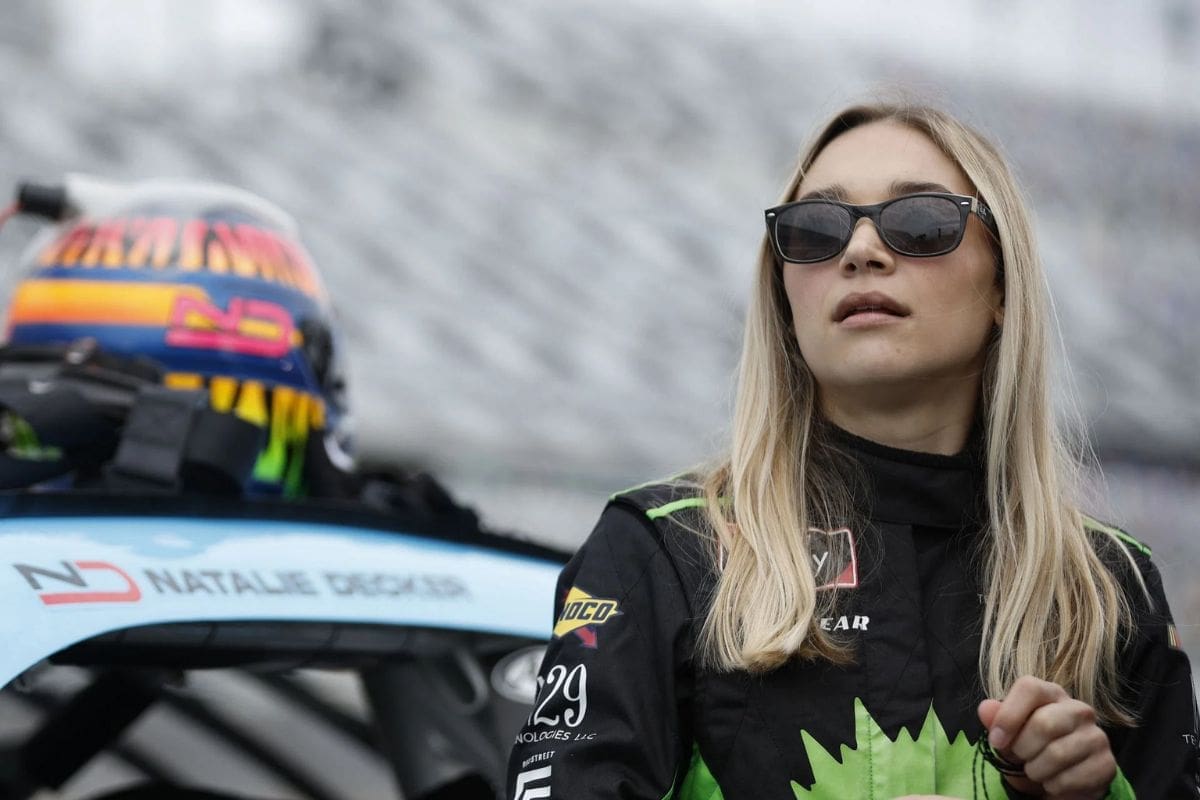Natalie Decker Frustrated on Radio: Natalie Decker’s recent experience at Charlotte Motor Speedway highlighted the significant challenges faced by part-time drivers in the Xfinity Series. Her frustration, audible over the team radio, generated from limited seat time that hindered her ability to adjust to both the car and the track conditions. Despite the guidance from crew chief Bryan Berry, Decker’s on-track struggles with maintaining speed and maneuvering through traffic were visible. This situation raises critical questions about the balance between practice and performance and how part-time racers can effectively bridge this gap to compete more consistently. What strategies can be employed to improve their competitive edge?
Key Takeaways
- Natalie Decker expressed frustration over limited seat time at Charlotte Motor Speedway.
- Decker’s performance declined, finishing 29th compared to 18th at Daytona.
- Struggles included cornering consistency, maintaining speed, and precise braking points.
- Crew chief Bryan Berry provided reassurance and tactical guidance during the race.
- Decker emphasized the need for more consistent seat time for skill development.
Natalie Decker’s Struggles at Charlotte
Natalie Decker struggled greatly at Charlotte Motor Speedway while driving for DGM Racing in the Xfinity Series. Reunited with the No. 92 car for the initial time since the season opener at Daytona, Decker faced a challenging race on the mile-and-a-half track. The shift back into the car was not seamless, as the layout and demands of Charlotte Motor Speedway posed considerable hurdles.
Decker’s difficulties were compounded by limited seat time, a critical factor for any driver to adjust to the car’s handling and track conditions effectively. The lack of continuous practice sessions, often a crucial element in crucial driver confidence and performance, was evident in her struggle.
Furthermore, Decker’s return to the No. 92 car involved adapting to the team dynamics and communication systems within DGM Racing. Synchronizing with the crew and fine-tuning the car setup to her driving style in such a brief period presented additional challenges.
While the race at Charlotte Motor Speedway highlighted the demanding nature of the Xfinity Series, it also highlighted the resilience required from drivers like Decker. The shift between different tracks and teams requires not only skill but also adaptability and mental fortitude. Decker’s experience at Charlotte serves as a demonstration to the ongoing learning and adjustments necessary in the competitive domain of NASCAR racing.

On-Track Difficulties
Amid mounting frustration, Natalie Decker candidly communicated her difficulties over the radio, attributing them to her limited recent seat time and the challenging nature of Charlotte Motor Speedway. Decker’s struggle to find her rhythm on the track was palpable, as she grappled with the intricacies of the circuit and the demands it placed on drivers.
“I am just getting so frustrated with myself.”-(natalie)
“I am struggling!! I haven’t been in the seat in FOREVER and this is a very challenging track.”-(natalie)
Charlotte Motor Speedway, known for its complex layout and high-speed sections, presents unique challenges that require significant seat time to master. Decker’s limited practice and racing opportunities in recent months evidently handicapped her performance, leading to a series of on-track difficulties. Her radio transmissions revealed a driver aiming to adapt but feeling increasingly overwhelmed by the relentless pace and technical demands of the track.
Key on-track difficulties included:
- Cornering Consistency: Decker experienced challenges maintaining consistent speed and line through the track’s corners, a critical aspect of competitive racing at Charlotte.
- Braking Points: Identifying and executing precise braking points proved to be a significant hurdle, impacting her ability to maintain peak lap times.
- Traffic Navigation: Handling the dynamics of racing in close quarters with other vehicles posed additional stress, complicating her efforts to find a competitive groove.
- Tire Management: The high-speed nature of the track placed considerable strain on tire management, making it difficult for Decker to sustain performance over longer runs.
These difficulties underscore the importance of regular seat time and extensive practice, both of which Decker had been lacking. Without ample opportunity to acclimate to the track’s demands, her performance inevitably suffered, culminating in a race fraught with frustration and challenges. This experience highlights the critical interplay between preparation and execution in motorsport.
“I am struggling!! I haven’t been in the seat in FOREVER and this is a very challenging track. I am just getting so frustrated with myself.” — @NatalieRacing
Crew Chief Bryan Berry reassures her that everything is O K A Y.#NASCAR | @TeamChevy | #BetMGM300
— DGM Racing (@dgm_racing_) May 25, 2024
Crew Chief Support
Crew chief Bryan Berry provided critical support to Natalie Decker, offering reassurance and emphasizing the importance of learning from mistakes. During Decker’s challenging stint at the Charlotte track, Berry remained a steadfast source of encouragement, recognizing the inherent difficulties that come with sporadic racing schedules and limited seat time. His approach was not only to console but to instill a mindset of growth and resilience.
Berry’s guidance was crucial, as he communicated to Decker that her frustrations were a natural part of the racing experience, especially for a driver managing the complexities of part-time competition. This reassurance was essential in helping Decker maintain focus and not be overly critical of herself. Berry’s experience and calm demeanor were clear as he conveyed the broader perspective of the racing season, stressing that there was ample opportunity ahead for improvement and success.
To illustrate Berry’s supportive role, the following table outlines key aspects of his guidance during the Charlotte race:
| Key Aspect | Description | Impact on Decker |
|---|---|---|
| Reassurance | Emphasized that mistakes are normal | Reduced pressure, improved morale |
| Perspective | Highlighted the long season ahead | Helped Decker see beyond immediate issues |
| Encouragement | Maintained a positive outlook | Strengthened confidence and resolve |
| Experience Sharing | Drew from his own racing experiences | Provided relatable insights |
| Strategic Advice | Offered tactical guidance for on-track decisions | Improved decision-making during the race |
“`
Berry’s role was instrumental in ensuring that Decker’s frustrations did not overshadow her potential. His support emphasized the importance of perseverance and continuous learning, vital for any driver aiming to excel in the competitive world of motorsports. Through his experienced guidance, Decker was able to channel her frustrations constructively, laying the groundwork for future growth and success.

Challenges of Part-Time Racing
Mastering the intricacies of part-time racing, Decker emphasized the substantial funding and sponsorship challenges that impede consistent competitive performance in NASCAR. Her limited participation, with only 11 Xfinity Series starts over four years, starkly contrasts the sustained seat time enjoyed by full-time drivers. The sporadic nature of her racing schedule introduces several critical obstacles.
Decker’s experience highlights the following challenges faced by part-time racers:
- Important: Securing adequate funding and sponsorship is a perpetual struggle. Part-time racers often face difficulties attracting the necessary financial backing, impacting their ability to participate in more events.
- Thorough: Limited track time results in less opportunity to hone skills and adapt to varying race conditions. This lack of continuous experience can place part-time drivers at a distinct disadvantage.
- Significant: Building a cohesive team environment is more challenging for part-time racers. Consistent crew and driver collaboration, essential for success, is harder to maintain with an intermittent schedule.
- Maximize: Sporadic participation complicates the ability to gather performance data and make iterative improvements. Full-time drivers benefit from continuous feedback loops, allowing for strategic adjustments that part-time racers miss out on.
Decker’s frustrations during the Charlotte event highlight the broader systemic issues inherent in part-time racing. These constraints greatly limit the potential for part-time competitors to perform on par with their full-time peers. Addressing these challenges requires strategic financial planning, targeted sponsorship acquisition, and leveraging every available opportunity for seat time. The complexity and demands of NASCAR racing necessitate a thorough approach, one that part-time racers must navigate astutely to optimize their chances of success.
Race Performance and Reflection
During the Charlotte race, Decker’s limited seat time and experience emerged as critical factors, causing her to struggle with pace and ultimately finish in 29th place. This performance marked a significant decline from her 18th place finish at Daytona earlier in the season.
“Do you want to talk about how difficult it is to be a part-time driver? Because I’m racing against all of these drivers that are in and out of the car, every single weekend. They have made more laps this year in the Xfinity Series than I have made in my entire life racing in the Xfinity Series. So it’s really difficult, getting in and getting up to speed and doing what I know what I’m capable of doing.”-(natalie)
Throughout the race, Decker found it difficult to keep up with the frontrunners, including seasoned drivers like Kyle Busch. As the laps progressed, she was lapped by the leaders, a clear indication of the pace differential. Her frustration was visible over the team radio, reflecting the mounting pressure and the steep learning curve she faces. Despite her best efforts, the lack of seat time hindered her ability to adjust to the car’s handling and the track’s characteristics.
Moving forward, Decker’s focus will likely be on securing more track time and working closely with her team to analyze performance data. By doing so, she aims to bridge the experience gap and strengthen her competitive edge.
The Charlotte race served as a stark reminder of the importance of consistency and experience in achieving success at this level of racing.

News in Brief: Natalie Decker Frustrated on Radio
The challenges faced by Natalie Decker at Charlotte Motor Speedway show the difficulties inherent in the Xfinity Series, particularly for part-time drivers. Limited seat time exacerbated issues related to traffic navigation, speed maintenance, and braking point identification, despite crew chief Bryan Berry’s support.
These struggles highlight the critical need for consistent practice and experience to improve race performance. Decker’s situation presents the demanding nature of professional racing and the steep learning curve involved.
Also Read: Natalie Decker’s NASCAR Practice Solution: Revolutionary Fix

